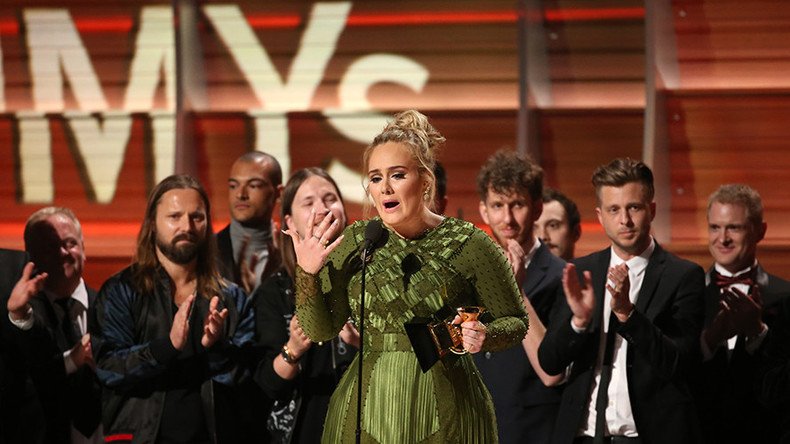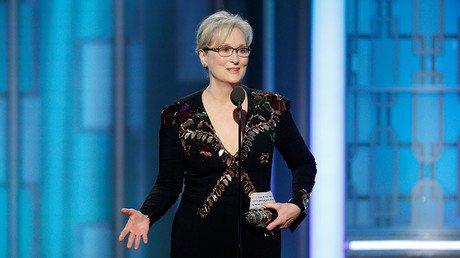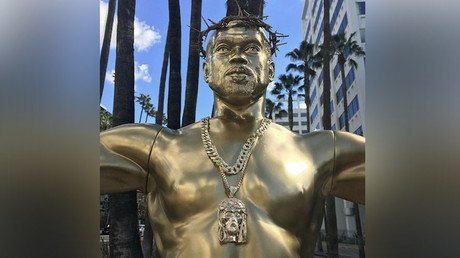#GrammysSoWhite: Is White privilege really repressing Black entertainers?

With the ugly history of discrimination against them, it is understandable that Black artists would feel awards shows disregard them solely because of their race… but is that perception accurate?
Earlier this month, Adele grabbed the Grammy for Best Album over Beyonce, and there have been cries of racism in the media against the Recording Academy ever since. The next morning, both the New York Times and Washington Post were carrying articles decrying the awards as racist and making claims of #GrammysSoWhite.
The New York Times opined, “The Grammys’ race problem is so pernicious that some white winners have chosen contrition over exuberance.”
While The Washington Post wrote, “Somehow, lots of listeners are fine with shrugging this off. Some balk at taking a nice Sunday evening television show and making it about race (Counterpoint: It would be irresponsible not to).”
This Grammy controversy, combined with the #OscarsSoWhite uproar last year over the absence of Black actors nominated for Oscars, gives the impression that both the music and film industries have serious racial issues. But do the Grammys and Oscars actually have a “pernicious” race problem? A closer look at the relationship between the Grammys, Oscars, and race is warranted to determine whether these charges are factual and substantial – or emotional and scurrilous.
A good place to start the investigation is to see if Black artists are under-represented in awards in relation to their population percentage. According to the US Census, African-Americans make up 12.6 percent of the population. A review of the number of Grammy and Oscar nominations and wins for Black artists over the last thirty years (1988-2017) will indicate whether or not they are under-represented.
The four most prestigious categories for the Grammys are Best Album, Record of the year, Song of the Year, and Best New Artist. Over the last thirty years, 37 percent (56) of nominees in the Best Album category were Black artists and they won 23 percent of the awards.
In the Record of the Year category, Black artists have scored 36 percent (54) of the nominations and won 20 percent of the awards.
In the Song of the Year category, Black artists have received 28 percent (42) of the nominations and prevailed in winning 23 percent (7) of the awards.
And in the Best New Artist category, Black artists have been nominated 32.6 percent (49) of the time, and triumphed 40 percent (12) of the time.
It is obvious upon reviewing the data that, over the last 30 years, Black artists are, in fact, substantially over-represented at the Grammys in relation to their percentage of the US population.
Regarding this year’s supposed racial controversy, Beyonce has won a total of 22 Grammys (one in the big four categories) over the course of her stellar career, which is the 8th most all-time. Of the top four Grammy winners in history, three are Black artists – Stevie Wonder, Quincy Jones, and Beyonce. Alyson Krause is the only white artist on that list. It seems to me that if the Grammys have a “pernicious” race problem, they sure have a funny way of showing it.
Statistics on the success of Black artists at the Academy Awards over the last 30 years (1988-2017) are quite illuminating as well. In the Best Actor category, Black actors have received 10.6 percent (16) of the nominations and won 10 percent (3) of the awards.
For the Best Supporting Actor award, Black actors have been nominated 8 percent (12) of the time and taken home the golden statue 10 percent (3) of the time.
Black actresses have been nominated for 9.3 percent (14) of the Best Supporting Actress awards and won 16.6 percent (5) of the time.
Lastly, the Best Actress category has had Black nominees 4 percent of the time, and only Halle Berry has won the award, which amounts to a paltry 3.3 percent of the awards.
At first glance, it would seem that, unlike the Grammys, the Oscars definitely have a race problem, as in only one category (Best Supporting Actress wins, at 16.6 percent), do Black artists equal or surpass the percentage of African-Americans in the US population. However, looking more deeply into the numbers reveals that this alleged race issue is more illusion than reality.
If you expand the parameters of the debate beyond US borders – and I think it is fair to do so since Hollywood draws the overwhelming majority of its acting talent from the US, UK, Canada, Ireland, and Australia, also known as the ‘Anglosphere’, which consists of all the major countries that speak English as their first language – then the supposed dearth of nominations and wins for Black actors all but disappears. If you combine the populations of Anglosphere nations, Black citizens make up 9 percent of that general population.
When taking into consideration that Blacks make up 9 percent of the population of the Anglosphere, Black actors are actually over-represented in Best Actor nominations (10.6 percent) and wins (10 percent), Best Supporting Actress nominations (9.3 percent) and wins (16.6 percent), and in wins for Best Supporting Actor (10 percent). However, the numbers reflect a slight under-representation in Best Supporting Actor nominations (8 percent) and a large under-representation in the Best Actress category in both wins (3.3 percent) and nominations (4 percent).
In addition, if the Black actors nominated this year win, then the data is even more compelling against the Oscars having a race problem. If Denzel Washington wins Best Actor and, as expected, and Marshehala Ali wins Best Supporting Actor, then the Black actor win rate over the last thirty years in those two categories becomes 13.3 percent, which is not only higher than the Black population percentage of the Anglosphere (9 percent), but also of the US (12.6 percent). If heavy favorite Viola Davis wins Best Supporting Actress, the win rate for Black actresses in that category will swell to 20 percent, more than double the Anglosphere’s Black population percentage (9 percent), and considerably more than the US percentage (12.6 percent). If Ruth Negga wins Best Actress, which would be a huge upset, then the win rate for Black Actresses in that category would grow to a still lackluster 6.6 percent.
The #OscarsSoWhite argument also makes claims that Black artists are discriminated against in casting, but those charges ring just as hollow when you look at the data. According to the Screen Actors Guild, Black actors make up 12 percent of their members, just below the African-American population percentage (12.6 percent). A Screen Actors Guild study from 2008 (the most recent year available) reports that Black actors are cast in 14.8 percent of all film and television roles, including 13.2 percent of leading roles and 16 percent of supporting roles.
What these studies and the historical data prove is that Black artists are not under-represented at the Grammys, or the Oscars, or in films, or on TV, but in many cases actually over-represented in relation to their population percentage. So why does the perception that racism is prevalent in these entertainment fields persist? I believe the biggest reason is a failure to set aside emotional arguments and put the statistical data into proper demographic context.
A case in point was when The Economist magazine conducted a study last year that found Black actors have been cast in 9 percent of “top roles” in films since 2000. The Economist used this evidence to conclude that Black actors are under-represented due to the 9 percent “top role” number being below the 12.6 percent US population percentage of African-Americans. What The Economist failed to take into account was the broader population of the Anglosphere, which would put this 9 percent “top role” number right in line with the Black population percentage in major English speaking countries.
Another example of this sort of analytical blindness was on display this week in The Guardian, where a writer was horrified to learn that Black artists had only won 10 Best Album Grammys since 1959. When you put the fact of “only” 10 Black artists winning Best Album over 58 years into demographic context, you discover that means Black artists won 17.2 percent of the Best Album awards over that time, which is considerably more than their population percentage in the US.
Simply put, Black artists are thriving in show business. As an example, the Forbes 2014 list of the ten most powerful people in entertainment had Beyonce in the number one spot and African-Americans in seven of the top ten positions.
These knee-jerk cries of racism after alleged awards snubs are emotionally-driven and undermine more substantial claims of discrimination regarding issues that are much more serious, such as police brutality, incarceration rates, economic opportunity, and healthcare quality.
These scurrilous accusations of award show prejudice make a mockery of the struggle against the scourge of racial inequality and injustice. There’s no accounting for taste, but to chalk up awards losses by Black artists to racial animus is a cheap way to avoid artistic responsibility and ignore demographic reality.
Michael McCaffrey, for RT
Michael McCaffrey is a freelance writer, film critic and cultural commentator. He currently resides in Los Angeles where he runs his acting coaching and media consulting business. mpmacting.com/blog/
The statements, views and opinions expressed in this column are solely those of the author and do not necessarily represent those of RT.














